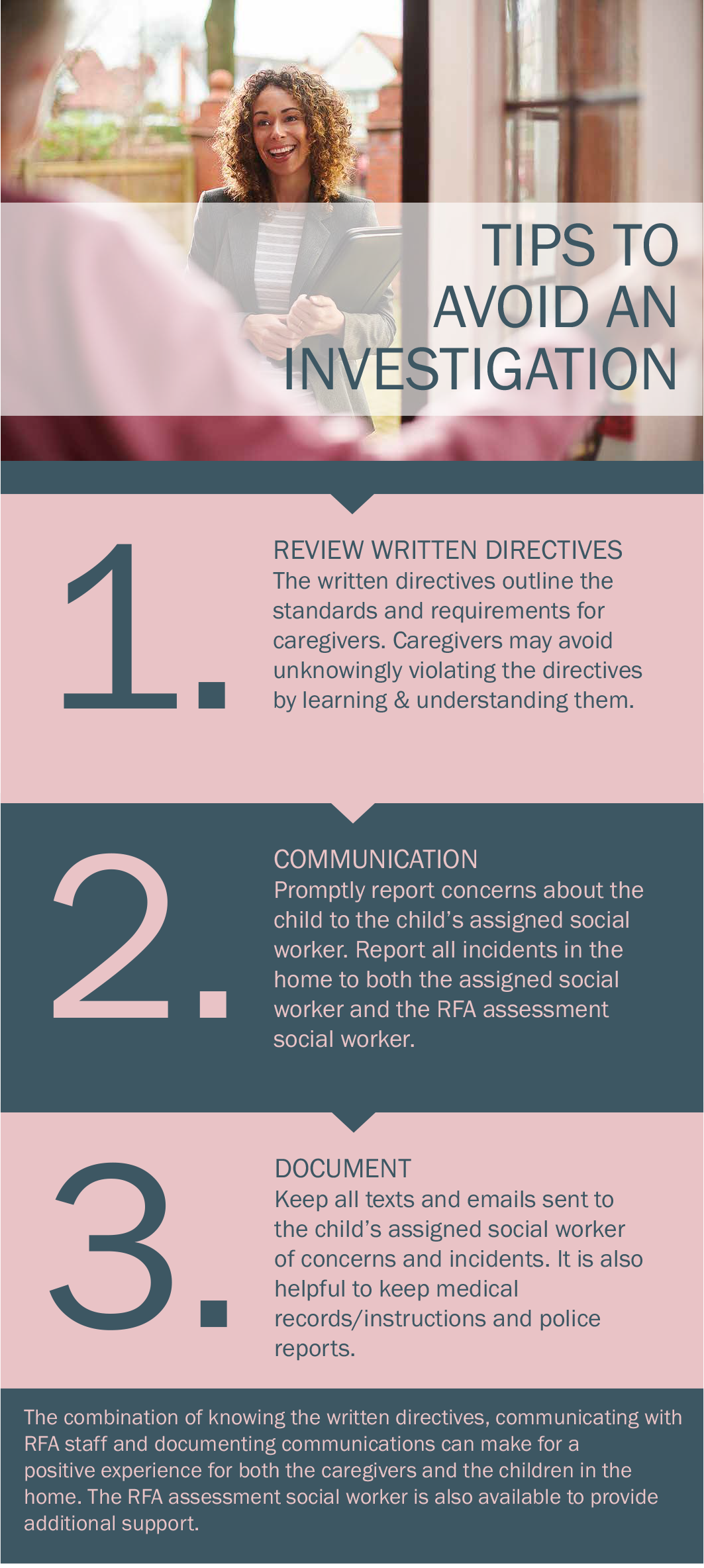
July 2021
Demystifying Complaint Investigations
As a caregiver, it may feel overwhelming to have a Resource Family Approval (RFA) complaint investigator knock on your door. You might be thinking, “Who are these social workers? What are they investigating? Who made a complaint against my home? How was the report made? What does an investigation entail?”
How Reports are Made and Investigations Initiated
The County of Orange Social Services Agency (SSA) RFA Complaint Investigations unit, part of the Agency’s Children and Family Services Division, comprises social workers whose responsibility is to investigate complaints made against RFA-approved homes. Complaints may be made by anyone, including, but not limited to, mandated reporters, assigned social workers, service providers and family members.
Complaints are most often received by the Orange County Child Abuse Registry (CAR). CAR will determine if the allegations meet the threshold to be investigated for potential child abuse. An SSA Foster Care Investigations (FCI) social worker may be assigned to investigate the allegations. The FCI social worker will determine if child abuse occurred as defined by the California Penal Codes. The FCI social worker will also determine if there are immediate safety threats to the child that need to be addressed.
CAR also forwards the reported allegations to the RFA Complaint Investigations unit to determine if a violation of the RFA Written Directives has occurred. The written directives defines guidelines and requirements for the approval process as well as direction on how caregivers should provide care for a child placed in their home.
Upon review of the allegations, a supervisor will determine if a formal complaint investigation is required or if the identified concerns can be assessed through a case management review of the home.
Case Management Reviews and Formal Investigations
The written directives state that a case management review of the home may be conducted if “a county determines that even if the allegation is true, it can be mitigated through engagement with the resource family and there is no risk or threat to the health, safety, protection or well-being of a child or nonminor dependent, or the risk or threat is so minimal that it does not outweigh the benefit of a case management response.”
During a case management review, the RFA complaint investigator will address the concerns with the caregiver and provide education and support. If additional concerns are identified, the RFA complaint investigator may escalate the allegations to a formal investigation for further evaluation and intervention.
When assigned a formal investigation, an RFA complaint investigator has 10 days to conduct an unannounced visit to the caregiver’s home. During the visit, the investigator will speak with the caregiver and the children regarding the concerns. The investigating social worker has 60 days to conduct a full investigation. This investigation may include speaking to the children’s assigned social workers, collecting medical information and records as well as police reports, if applicable. The investigator will determine if a violation of the written directives has occurred and will determine if the allegations are one of the following:
- Substantiated
The allegation in a complaint occurred based on a preponderance of the evidence.
- Inconclusive
The allegation in a complaint is not substantiated or unfounded.
- Unfounded
There is no credible evidence that the allegation in the complaint occurred and is deemed false.
If the allegations are substantiated, and the violation of the written directives can be corrected, the investigator will develop a corrective action plan with the caregiver. The corrective action plan may include reviewing the written directives with the caregiver or providing additional training opportunities to address the concerns.






